Mossadegh in US, 1951
Printed From: History Community ~ All Empires
Category: General History
Forum Name: Historical Pictures Gallery
Forum Discription: Post and discuss images of historical places, arts and maps...
URL: http://www.allempires.com/forum/forum_posts.asp?TID=9565
Printed Date: 20-May-2024 at 20:28
Software Version: Web Wiz Forums 9.56a - http://www.webwizforums.com
Topic: Mossadegh in US, 1951
Posted By: Behi
Subject: Mossadegh in US, 1951
Date Posted: 26-Feb-2006 at 20:26
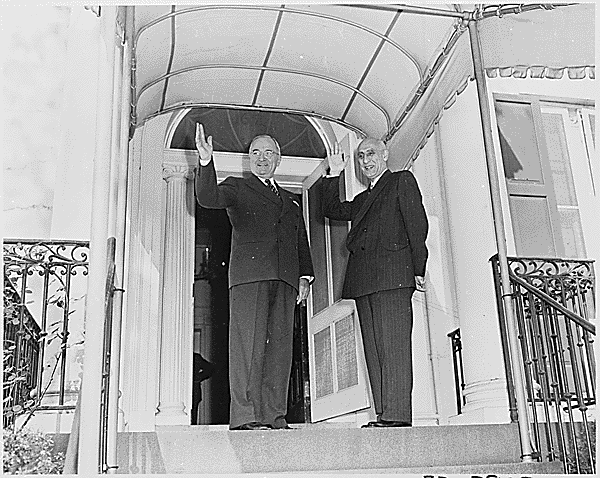 President Truman and Prime Minister Mohammad Mossadegh of Iran.  Prime Minister Mohammed Mossadegh of Iran signing the guestbook at Independence Hall in Philadelphia with Mayor Bernard Samuels.  Prime Minister Mohammed Mossadegh examining the famous Liberty Bell, which rung in 1776, while visiting Independence Hall in Philadelphia. He was joined by Mayor Bernard Samuels. 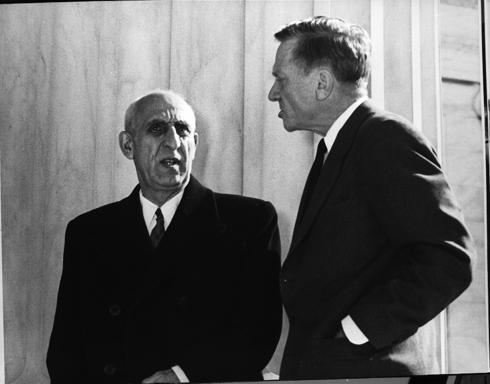 While visiting the Supreme Court in Washington D.C., Prime Minister Mohammed Mossadegh of Iran chatted with Associate Justice Douglas. 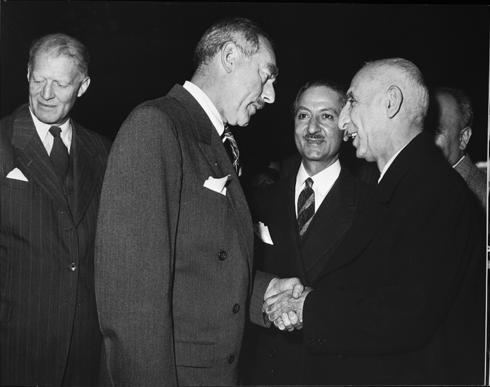 Prime Minister Mohammed Mossadegh of Iran being greeted by Dean Acheson at the Union Station in Washington D.C. 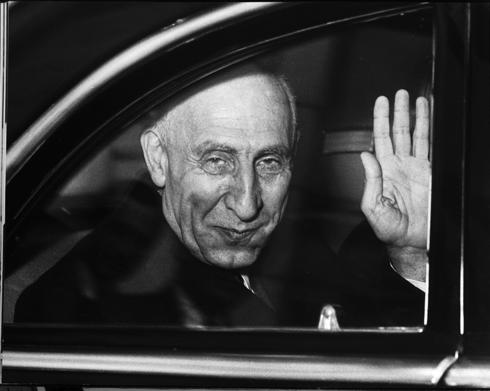 Prime Minister Mohammed Mossadegh of Iran waves as he leaves Union Station for the Iranian Embassy in Washington D.C.  President Harry S. Truman greets Prime Minister Mohammed Mossadegh of Iran as the latter arrives at Blair House, temporary Presidential residence in Washington D.C.  Secretary Dean Acheson confers with Prime Minister Mohammed Mossadegh of Iran at the Walter Reed Army Medical Center in Washington D.C. 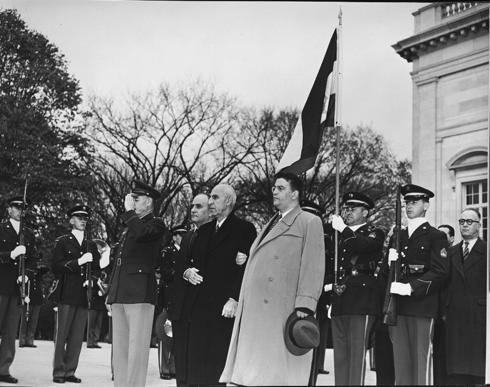 Standing at attention in ceremonies at Arlington National Cemetary, near Washington D.C. in the foreground, left to right, Dr. M. Baghai, member of the Iranian Parliament; Prime Minister Mohammed Mossadegh of Iran, Gen. Thomas W. Herren. 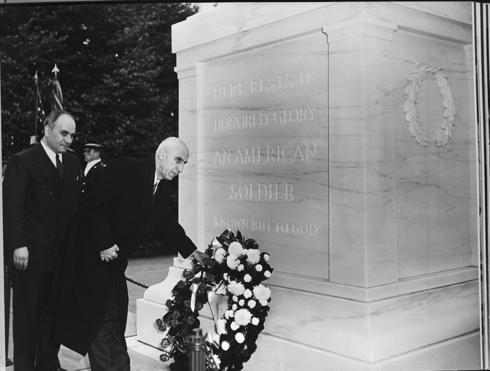 Prime Minister Mohammed Mossadegh of Iran at the tomb of the Unkown Soldier of WWI in Arlington National Cemetery in Washington D.C. 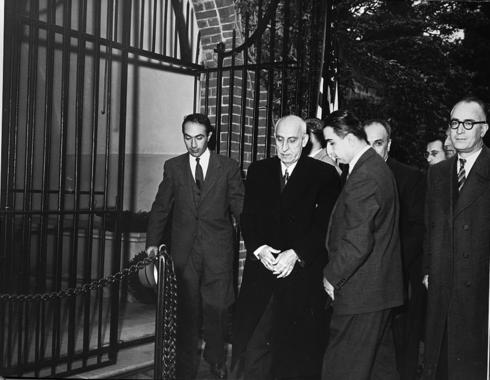 Prime Minister Mohammed Mossadegh of Iran at the tomb of George Washington at Mount Vernon. 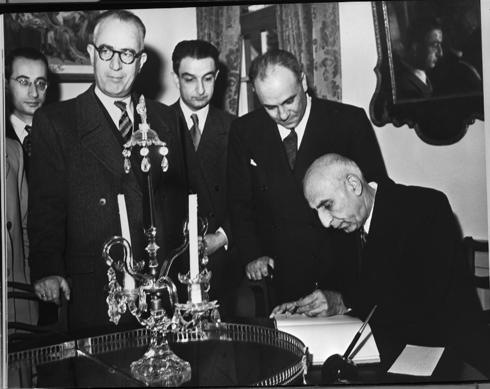 Prime Minister Mohammed Mossadegh of Iran signed the guest book while visitng Mount Vernon. 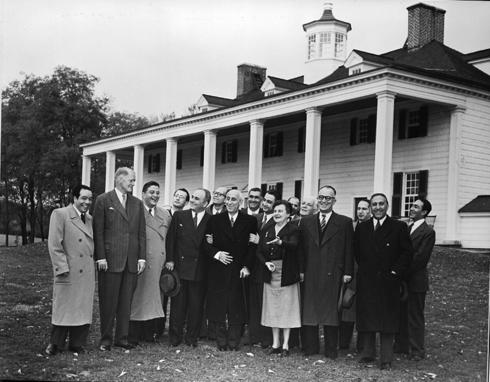 Prime Minister Mohammed Mossadegh of Iran joined others for a picture on the lawn of Mount Vernon. 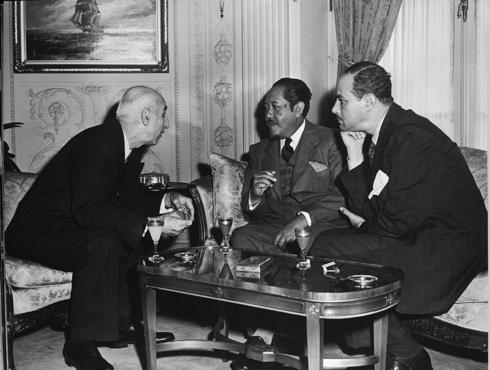 Prime Minister Mohammed Mossadegh of Iran visted with Dr. Ali Sastroamidjojo and Mohammed Kamil Bey Abul Rahim while at the Egyptian Embassy in Washington D.C. 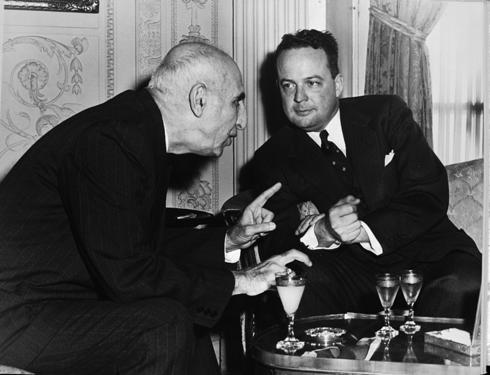 Prime Minister Mohammed Mossadegh of Iran visiting with George McGhee at the Egyptian Embassy in Washington D.C.  Prime Minister Mohammed Mossadegh of Iran discussing the architectural features of the Supreme Court Building with Lieut. Col. Vernon A. Walters, Justice William O. Douglas, A. Saleh, and Dr. Ardalan.  Prime Minister Mohammed Mossadegh of Iran is greeted at the National Press Club, Washington D.C., by Henry F. Grady. 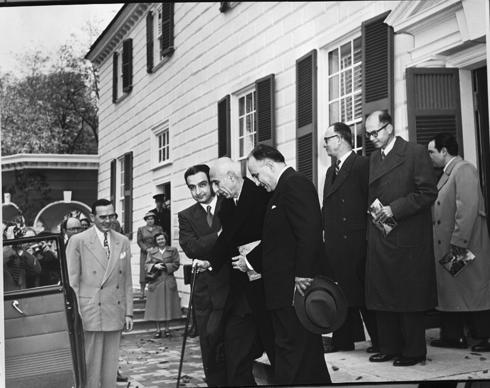 Prime Minister Mohammed Mossadegh of Iran is joined by others as he departs from Mount Vernon.  Prime Minister Mohammed Mossadegh of Iran on the steps of the Supreme Court Building in Washington D.C., he is joined by Lieutenant Colonel Vernon A. Walters, William O. Douglas, A. Seleh, and Dr. Ardalan (four of them pictured here). 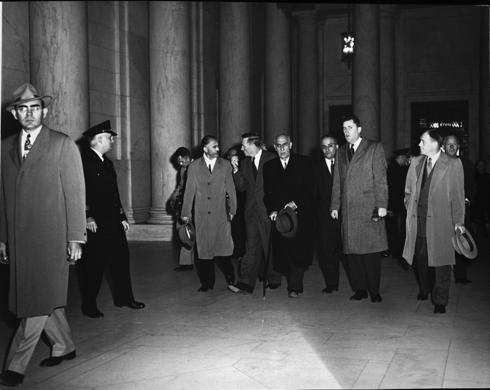 Prime Minister Mohammed Mossadegh of Iran inspected the inside of the Supreme Court building in Washington D.C. He was accompanied by Lt. Col. Vernon A. Walters, William O. Douglas, A. Saleh, and Dr. Ardalan.  Prime Minister Mohammed Mossadegh of Iran leaving the Supreme Court building in Washington D.C. with Lieut. Col. Vernon A. Walters, William O Douglas, A. Saleh, and Dr. Ardalan. 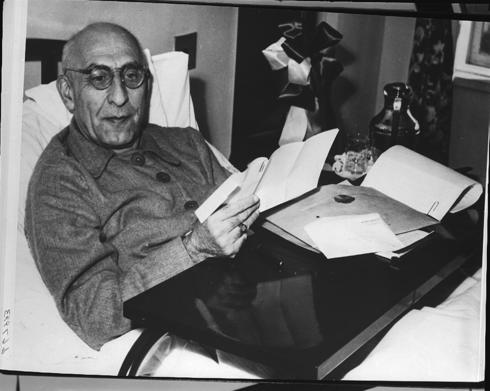 Prime Minister Mohammad Mossadegh of Iran in a New York City hospital where he went to regain his strength shortly after his arrival in the United States. 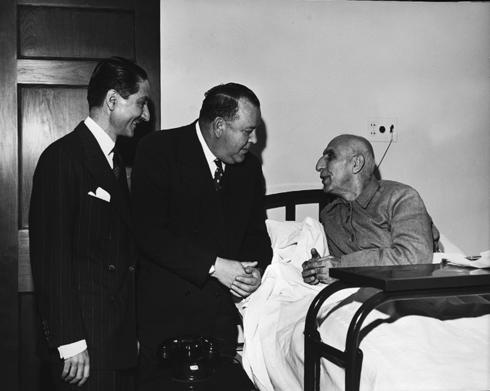 Prime Minister Mohammad Mossadegh of Iran confers in a New York Hospital with Trygve Lie Secretary General of the United Nations and Nasrollah Entezam, Ambassador of Iran to the United States. 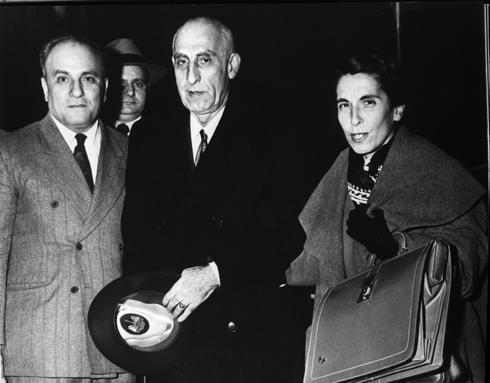 Prime Minister Mohammad Mossadegh of Iran enters the Ritz Tower Hotel in New York, after leaving the Hospital. He is accompanied by Dr. Gholem Hossein Mossadegh, his son, and by Zia Achraf Bayat, his daughter. 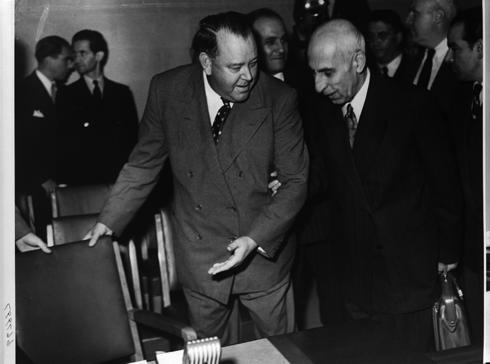 Prime Minister Mohammad Mossadegh of Iran being shown to his seat at the United Nations Security Council by Trygve Lie, Secretary General of the United Nations. 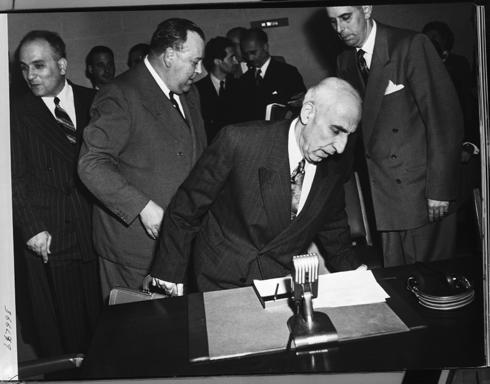 Prime Minister Mohammad Mossadegh of Iran takes his seat at the United Nations Security Council in New York City. 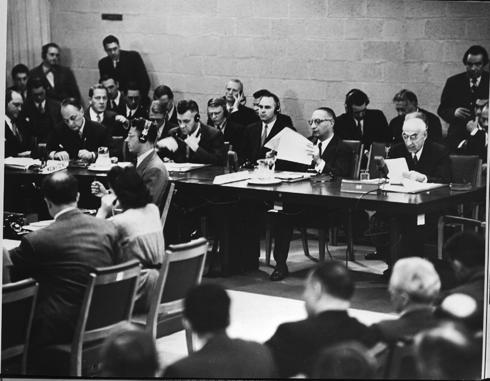 Prime Minister Mohammad Mossadegh of Iran takes his seat at the United Nations Security Council in New York City. 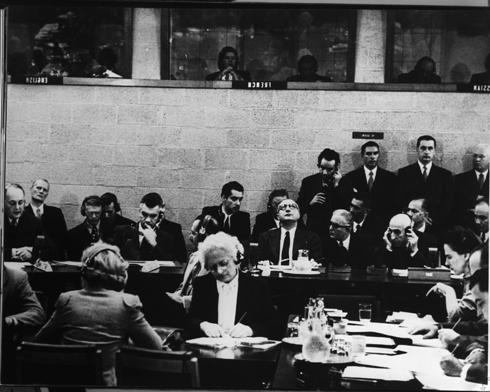 Prime Minister Mohammad Mossadegh of Iran uses headphones to listen to a translation during the United Nations Security Council in New York City. 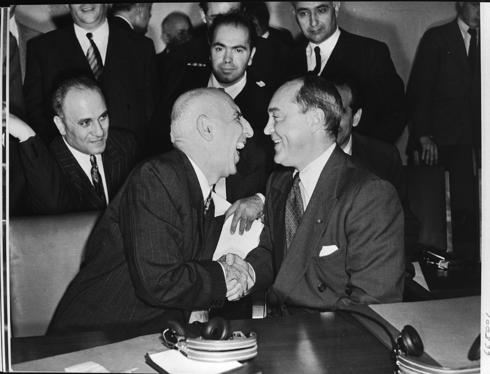 Prime Minister Mohammad Mossadegh of Iran delighted by a remark made by Ernest A. Gross at the United Nations Security Council in New York City. 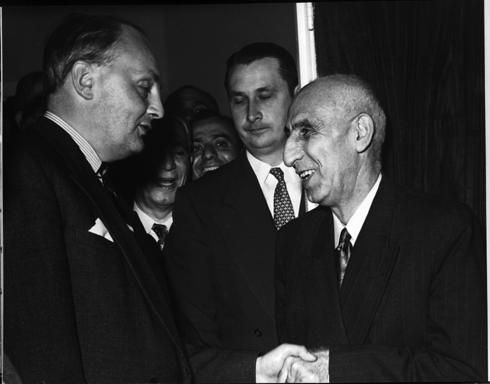 Prime Minister Mohammad Mossadegh of Iran shaking hands with Sr. Gladwyn Jebb at the United Nations Security Council in New York City.  Before his departure for Iran, Prime Minister Mohammed Mossadegh has his final view of the United States from the airplane at the airport in New York City. With him is his daughter Zia Achraf Bayat. From photograph album "Visit of his Excellency Mohammad Mossadegh, Prime Minister of Iran, to the United States of America, October 6 to November 18, 1951. |
Replies:
Posted By: Behi
Date Posted: 26-Feb-2006 at 20:31
|
He went to UN to defend Iranian rights in Oil Nationalization. He could cut UK from iran oil but his goverment fallen next year by military coup planed by US & UK I highly reccmand read this book:  About: " On http://en.wikipedia.org/wiki/April_4" title="April 4 - April 4 , http://en.wikipedia.org/wiki/1953" title="1953 - 1953 , US http://en.wikipedia.org/wiki/Central_Intelligence_Agency" title="Central Intelligence Agency - Central Intelligence Agency director http://en.wikipedia.org/wiki/Allen_W._Dulles" title="Allen W. Dulles - Allen W. Dulles approved $1 million to be used "in any way that would bring about the fall of Mossadegh." Soon the CIA's Tehran station started to launch a propaganda campaign against Mossadegh. Finally, according to http://en.wikipedia.org/wiki/The_New_York_Times" title="The New York Times - The New York Times , in early June, American and British intelligence officials met again, this time in Beirut, and put the finishing touches on the strategy. Soon afterward, according to his later published accounts, the chief of the CIA's Near East and Africa division, http://en.wikipedia.org/wiki/Kermit_Roosevelt%2C_Jr." title="Kermit Roosevelt, Jr. - Kermit Roosevelt, Jr. a grandson of Theodore Roosevelt, arrived in Tehran to direct it. The plot, known as http://en.wikipedia.org/wiki/Operation_Ajax" title="Operation Ajax - Operation Ajax , centered around convincing Iran's monarch to use his constitutional authority to dismiss Mossadegh from office, as he had attempted some months earlier. But the Shah was uncooperative, and it would take much persuasion and many meetings to successfully execute the plan. Meanwhile, the CIA stepped up its operations. According to http://en.wikipedia.org/wiki/Donald_Wilber" title="Donald Wilber - Dr. Donald N. Wilber , who was involved in the plot to remove Mossadegh from power, in early August, Iranian CIA operatives pretending to be socialists and nationalists threatened Muslim leaders with "savage punishment if they opposed Mossadegh," thereby giving the impression that Mossadegh was cracking down on dissent, and stirring anti-Mossadegh sentiments within the religious community. Mossadegh became aware of the plots against him and grew increasingly wary of conspirators acting within his government. He set up a national http://en.wikipedia.org/wiki/Referendum" title="Referendum - referendum to dissolve parliament. Some purport that the vote was rigged, with Mossadegh claiming a 99.9 percent victory for the "yes" side. Allegations that Mossadegh was resorting to http://en.wikipedia.org/wiki/Dictator" title="Dictator - dictatorial tactics to stay in power were in turn cited by US- and British-supported opposition press as a reason to remove Mossadegh from power. Parliament was suspended indefinitely, and Mossadegh's http://en.wikipedia.org/wiki/Emergency_powers" title="Emergency powers - emergency powers were extended. Inside Iran, Mossadegh's popularity was eroding as promised reforms failed to materialize and the economy continued to suffer due to heavy British sanctions. The Tudeh Party abandoned its alliance with Mossadegh, as did the conservative clerical factions. To remain in power Mossadegh knew he would have to continue consolidating his power. Since Iran's monarch was the only person who constitutionally outranked him, he perceived Iran's 33-year-old king to be his biggest threat. In http://en.wikipedia.org/wiki/August" title="August - August of http://en.wikipedia.org/wiki/1953" title="1953 - 1953 Mossadegh attempted to convince the Shah to leave the country. The Shah refused, and formally dismissed the Prime Minister, in accordance with the foreign intelligence plan. Mossadegh refused to quit, however, and when it became apparent that he was going to fight, the Shah, as a precautionary measure foreseen by the British/American plan, flew to http://en.wikipedia.org/wiki/Baghdad" title="Baghdad - Baghdad and on from there to http://en.wikipedia.org/wiki/Rome" title="Rome - Rome , http://en.wikipedia.org/wiki/Italy" title="Italy - Italy . " ------------- |
Posted By: Behi
Date Posted: 26-Feb-2006 at 20:33
Mohammed Mossadegh Dr. Mohammad Mossadegh
Dr. Mohammed Mossadegh ( http://en.wikipedia.org/wiki/Persian_language" title="Persian language - Persian : محمد مصدق) ( http://en.wikipedia.org/wiki/May_19" title="May 19 - May 19 , http://en.wikipedia.org/wiki/1882" title="1882 - 1882 - http://en.wikipedia.org/wiki/March_4" title="March 4 - March 4 , http://en.wikipedia.org/wiki/1967" title="1967 - 1967 ) was http://en.wikipedia.org/wiki/Prime_minister" title="Prime minister - prime minister of http://en.wikipedia.org/wiki/Iran" title="Iran - Iran from http://en.wikipedia.org/wiki/1951" title="1951 - 1951 to http://en.wikipedia.org/wiki/1953" title="1953 - 1953 . Mossadegh's name is sometimes spelled Mosaddegh or Mosaddeq (note the doubled "d"), the latter of which better reflects the original Persian pronunciation (mosæd'deq) and orthography. He was removed from power by http://en.wikipedia.org/wiki/Mohammad_Reza_Pahlavi" title="Mohammad Reza Pahlavi - Mohammad Reza Pahlavi , the http://en.wikipedia.org/wiki/Shah_of_Iran" title="Shah of Iran - Shah of Iran , and pro-monarchy forces in a complex coup led by British and US intelligence agencies.
< ="text/"> // [ http://en.wikipedia.org/w/index.php?title=Mohammed_Mossadegh&action=edit§ion=1" title="Mohammed Mossadegh - edit ]
Rise to PowerHe was a prominent member of the http://en.wikipedia.org/wiki/Qajar" title="Qajar - Qajar family. After being educated at the http://en.wikipedia.org/wiki/Paris_Institute_of_Political_Studies" title="Paris Institute of Political Studies - Paris Institute of Political Studies , Mohammed Mossadegh got his start in Iranian politics in http://en.wikipedia.org/wiki/1914" title="1914 - 1914 , when he was appointed http://en.wikipedia.org/wiki/Governor_General" title="Governor General - Governor General of the Iranian province of http://en.wikipedia.org/wiki/Fars" title="Fars - Fars by http://en.wikipedia.org/wiki/Ahmad_Shah_Qajar" title="Ahmad Shah Qajar - Ahmad Shah Qajar and was titled Mosaddegh os-Saltaneh by the Shah. He was later appointed http://en.wikipedia.org/wiki/Finance_minister" title="Finance minister - finance minister , in the government of http://en.wikipedia.org/wiki/Ghavam_os-Saltaneh" title="Ghavam os-Saltaneh - Ghavam os-Saltaneh in http://en.wikipedia.org/wiki/1921" title="1921 - 1921 , and then http://en.wikipedia.org/wiki/Foreign_minister" title="Foreign minister - foreign minister , in the government of Hassan Pirnia http://en.wikipedia.org/w/index.php?title=Moshir_od-Dowleh&action=edit" class="new" title="Moshir od-Dowleh - Moshir od-Dowleh in June, http://en.wikipedia.org/wiki/1923" title="1923 - 1923 . Later in http://en.wikipedia.org/wiki/1923" title="1923 - 1923 , he was elected to the http://en.wikipedia.org/wiki/Majlis_of_Iran" title="Majlis of Iran - Iranian parliament but resigned shortly after, following the selection of http://en.wikipedia.org/wiki/Reza_Pahlavi_of_Iran" title="Reza Pahlavi of Iran - Reza Pahlavi as http://en.wikipedia.org/wiki/Shah" title="Shah - Shah . By http://en.wikipedia.org/wiki/1944" title="1944 - 1944 Reza Pahlavi had abdicated, and Mossadegh was once again elected to parliament. This time he ran as a member of the http://en.wikipedia.org/wiki/National_Front_of_Iran" title="National Front of Iran - National Front of Iran (Jebhe Melli), a http://en.wikipedia.org/wiki/Nationalist" title="Nationalist - nationalist organization which he had founded that aimed to end the foreign presence that had established itself in Iran following the http://en.wikipedia.org/wiki/World_War_II" title="World War II - Second World War , especially regarding the exploitation of Iran's rich oil resources. After negotiations for higher oil royalties failed, on http://en.wikipedia.org/wiki/March_15" title="March 15 - March 15 , http://en.wikipedia.org/wiki/1951" title="1951 - 1951 the Iranian parliament (the http://en.wikipedia.org/wiki/Majlis" title="Majlis - Majlis ) voted to nationalize Iran's http://en.wikipedia.org/wiki/Petroleum" title="Petroleum - oil industry and seize control of the British-owned and operated http://en.wikipedia.org/wiki/Anglo-Iranian_Oil_Company" title="Anglo-Iranian Oil Company - Anglo-Iranian Oil Company (AIOC). Prime minister General http://en.wikipedia.org/w/index.php?title=Haji-Ali_Razmara&action=edit" class="new" title="Haji-Ali Razmara - Haji-Ali Razmara , elected in June http://en.wikipedia.org/wiki/1950" title="1950 - 1950 , had opposed the nationalization bill on technical grounds. He was assassinated on http://en.wikipedia.org/wiki/March_7" title="March 7 - March 7 , http://en.wikipedia.org/wiki/1951" title="1951 - 1951 by http://en.wikipedia.org/w/index.php?title=Khalil_Tahmasebi&action=edit" class="new" title="Khalil Tahmasebi - Khalil Tahmasebi , a member of the militant fundamentalist group http://en.wikipedia.org/w/index.php?title=Fadayan-e_Islam&action=edit" class="new" title="Fadayan-e Islam - Fadayan-e Islam . On April 28, 1951, the http://en.wikipedia.org/wiki/Majlis" title="Majlis - Majlis named Mossadegh as new prime minister by a vote of 79-12. Aware of Mossadegh's rising popularity and political power, the young Shah was left with no other option but to give assent to the Parliament's vote. Shortly after coming to office, Mossadegh enforced the Oil Nationalization Act, which involved the expropriation of the AIOC's assets. Responding to the latter, the British government announced it would not allow Mossadegh's government to export any oil produced in the formerly British-controlled factories. A blockade of British ships was established in the http://en.wikipedia.org/wiki/Persian_Gulf" title="Persian Gulf - Persian Gulf to prevent any attempts by Iran to ship oil out of the country. Furthermore, the AIOC withdrew its British trained technicians when Mossadegh nationalized the oil industry. Thus, many of the refineries lacked properly trained technicians that were needed to continue production. An economic stalemate thus ensued, with Mossadegh's government refusing to allow any British involvement in Iran's oil industry, and Britain refusing to allow any oil to leave Iran. Since Britain had long been Iran's primary oil-consumer, the stalemate was particularly hard on Iran. While the country had once boasted over a 100 million dollars a year in exports to Britain, after nationalization, the same oil industry began increasing Iran's http://en.wikipedia.org/wiki/Debt" title="Debt - debt by nearly 10 million dollars a month. The http://en.wikipedia.org/wiki/Abadan_Crisis" title="Abadan Crisis - Abadan Crisis quickly plunged the country into economic difficulties. Despite the economic hardships of his nationalization plan, Mossadegh remained popular, and in http://en.wikipedia.org/wiki/1952" title="1952 - 1952 was approved by parliament for a second term. Sensing the difficulties of a worsening political and economic climate, he announced that he would request the Shah grant him emergency powers. Thus, during the royal approval of his new http://en.wikipedia.org/wiki/Cabinet" title="Cabinet - cabinet , Mossadegh asked the Shah to grant him full control of the military and Ministry of War. The Shah refused, and Mossadegh announced his resignation. http://en.wikipedia.org/w/index.php?title=Ahmed_Qavam&action=edit" class="new" title="Ahmed Qavam - Ahmed Qavam was appointed as Iran's new prime minister. On the day of his appointment, he announced his intention to resume negotiations with the British to end the oil dispute. This blatant reversal of Mossadegh's plans sparked a massive public outrage. Protestors of all stripes filled the streets, including http://en.wikipedia.org/wiki/Communist" title="Communist - communists and radical http://en.wikipedia.org/wiki/Muslim" title="Muslim - Muslims led by http://en.wikipedia.org/wiki/Ayatollah_Kashani" title="Ayatollah Kashani - Ayatollah Kashani . Frightened by the unrest, the Shah quickly dismissed Qavam, and re-appointed Mossadegh, granting him the full control of the military he had previously requested. Taking advantage of his popularity, Mossadegh convinced the parliament to grant him increased powers and appointed Ayatollah Kashani as house speaker. Kashani's radical Muslims, as well as the http://en.wikipedia.org/wiki/Tudeh_Party" title="Tudeh Party - Tudeh Party , proved to be two of Mossadegh's key political allies, although both relationships were often strained. Mossadegh quickly implemented more socialist reforms. Iran's centuries old http://en.wikipedia.org/wiki/Feudal" title="Feudal - feudal http://en.wikipedia.org/wiki/Agriculture" title="Agriculture - agriculture sector was abolished, and replaced with a system of collective farming and government land ownership. [ http://en.wikipedia.org/w/index.php?title=Mohammed_Mossadegh&action=edit§ion=2" title="Mohammed Mossadegh - edit ]
Plot against Mossadegh http://en.wikipedia.org/wiki/Image:28mordad1332.jpg" class="internal" title="Soldiers surround the Parliament building in Tehran on August 19, 1953. -
http://en.wikipedia.org/wiki/Image:28mordad1332.jpg" class="internal" title="Enlarge -  Soldiers surround the Parliament building in http://en.wikipedia.org/wiki/Tehran" title="Tehran - Tehran on August 19, 1953. The government of Britain had grown increasingly distressed over Mossadegh's reforms and were especially bitter over the loss of their control on the Iranian oil industry. Despite Mossadegh's repeated attempts to negotiate a reasonable settlement with them they refused outright the same terms, and later total control over Iranian oil. Unable to resolve the issue singlehandedly due to its post second world war problems, Britain looked towards the http://en.wikipedia.org/wiki/United_States" title="United States - United States to settle the issue. The United States was falsely informed that Mossadegh was increasingly turning towards communism and was moving Iran towards the Soviet sphere at a time of high cold war fears. Acting on the fears created by Britain the United States and Britain began to publicly denounce Mossadegh's policies for Iran as harmful to the country. In October of http://en.wikipedia.org/wiki/1952" title="1952 - 1952 , Mossadegh declared that Britain was "an enemy," and cut all diplomatic relations with the United Kingdom. In November and December http://en.wikipedia.org/wiki/1952" title="1952 - 1952 , British intelligence officials suggested to American intelligence that the prime minister should be ousted. The new US administration under http://en.wikipedia.org/wiki/Dwight_Eisenhower" title="Dwight Eisenhower - Dwight Eisenhower and the British government under http://en.wikipedia.org/wiki/Winston_Churchill" title="Winston Churchill - Winston Churchill agreed to work together toward Mossadegh's removal. On http://en.wikipedia.org/wiki/April_4" title="April 4 - April 4 , http://en.wikipedia.org/wiki/1953" title="1953 - 1953 , US http://en.wikipedia.org/wiki/Central_Intelligence_Agency" title="Central Intelligence Agency - Central Intelligence Agency director http://en.wikipedia.org/wiki/Allen_W._Dulles" title="Allen W. Dulles - Allen W. Dulles approved $1 million to be used "in any way that would bring about the fall of Mossadegh." Soon the CIA's Tehran station started to launch a propaganda campaign against Mossadegh. Finally, according to http://en.wikipedia.org/wiki/The_New_York_Times" title="The New York Times - The New York Times , in early June, American and British intelligence officials met again, this time in Beirut, and put the finishing touches on the strategy. Soon afterward, according to his later published accounts, the chief of the CIA's Near East and Africa division, http://en.wikipedia.org/wiki/Kermit_Roosevelt%2C_Jr." title="Kermit Roosevelt, Jr. - Kermit Roosevelt, Jr. a grandson of Theodore Roosevelt, arrived in Tehran to direct it. The plot, known as http://en.wikipedia.org/wiki/Operation_Ajax" title="Operation Ajax - Operation Ajax , centered around convincing Iran's monarch to use his constitutional authority to dismiss Mossadegh from office, as he had attempted some months earlier. But the Shah was uncooperative, and it would take much persuasion and many meetings to successfully execute the plan. Meanwhile, the CIA stepped up its operations. According to http://en.wikipedia.org/wiki/Donald_Wilber" title="Donald Wilber - Dr. Donald N. Wilber , who was involved in the plot to remove Mossadegh from power, in early August, Iranian CIA operatives pretending to be socialists and nationalists threatened Muslim leaders with "savage punishment if they opposed Mossadegh," thereby giving the impression that Mossadegh was cracking down on dissent, and stirring anti-Mossadegh sentiments within the religious community. Mossadegh became aware of the plots against him and grew increasingly wary of conspirators acting within his government. He set up a national http://en.wikipedia.org/wiki/Referendum" title="Referendum - referendum to dissolve parliament. Some purport that the vote was rigged, with Mossadegh claiming a 99.9 percent victory for the "yes" side. Allegations that Mossadegh was resorting to http://en.wikipedia.org/wiki/Dictator" title="Dictator - dictatorial tactics to stay in power were in turn cited by US- and British-supported opposition press as a reason to remove Mossadegh from power. Parliament was suspended indefinitely, and Mossadegh's http://en.wikipedia.org/wiki/Emergency_powers" title="Emergency powers - emergency powers were extended. Inside Iran, Mossadegh's popularity was eroding as promised reforms failed to materialize and the economy continued to suffer due to heavy British sanctions. The Tudeh Party abandoned its alliance with Mossadegh, as did the conservative clerical factions. To remain in power Mossadegh knew he would have to continue consolidating his power. Since Iran's monarch was the only person who constitutionally outranked him, he perceived Iran's 33-year-old king to be his biggest threat. In http://en.wikipedia.org/wiki/August" title="August - August of http://en.wikipedia.org/wiki/1953" title="1953 - 1953 Mossadegh attempted to convince the Shah to leave the country. The Shah refused, and formally dismissed the Prime Minister, in accordance with the foreign intelligence plan. Mossadegh refused to quit, however, and when it became apparent that he was going to fight, the Shah, as a precautionary measure foreseen by the British/American plan, flew to http://en.wikipedia.org/wiki/Baghdad" title="Baghdad - Baghdad and on from there to http://en.wikipedia.org/wiki/Rome" title="Rome - Rome , http://en.wikipedia.org/wiki/Italy" title="Italy - Italy . Commentators assumed it was only a matter of time before Mossadegh declared Iran a http://en.wikipedia.org/wiki/Republic" title="Republic - republic and made himself http://en.wikipedia.org/wiki/President" title="President - president . This would have made him the http://en.wikipedia.org/wiki/Head_of_state" title="Head of state - head of state , something Mossadegh had promised he would never do. Once again, massive protests broke out across the nation. Anti- and pro-monarchy protestors violently clashed in the streets, leaving almost 300 dead. Funded with money from the U.S. CIA and the British http://en.wikipedia.org/wiki/Secret_Intelligence_Service" title="Secret Intelligence Service - MI6 , the pro-monarchy forces quickly gained the upper hand. The military intervened as the pro-Shah tank regiments stormed the capital and bombarded the prime minister's official residence. Mossadegh surrendered, and was arrested on http://en.wikipedia.org/wiki/August_19" title="August 19 - August 19 , http://en.wikipedia.org/wiki/1953" title="1953 - 1953 . One of the leaders of the coup, General http://en.wikipedia.org/wiki/Fazlollah_Zahedi" title="Fazlollah Zahedi - Fazlollah Zahedi , was proclaimed Prime Minister. The Shah himself, after a brief http://en.wikipedia.org/wiki/Exile" title="Exile - exile in http://en.wikipedia.org/wiki/Italy" title="Italy - Italy , was rushed back to Iran and returned to the throne. His attempted overthrow and subsequent restoration to power had all occurred within a week. Mossadegh was tried for treason, and sentenced to three years in prison. Following his release he remained under house arrest until his death in on http://en.wikipedia.org/wiki/March_5" title="March 5 - March 5 , http://en.wikipedia.org/wiki/1967" title="1967 - 1967 . The new government under the Shah in August http://en.wikipedia.org/wiki/1954" title="1954 - 1954 reached an agreement with foreign oil companies to "restore the flow of Iranian oil to world markets in substantial quantities." http://www.nytimes.com/library/world/mideast/080654iran-statements.html" class="external autonumber" title="http://www.nytimes.com/library/world/mideast/080654iran-statements.html - [1] . [ http://en.wikipedia.org/w/index.php?title=Mohammed_Mossadegh&action=edit§ion=3" title="Mohammed Mossadegh - edit ]
LegacyThe extent of the US role in Mossadegh's overthrow was not formally acknowledged for many years, although the Eisenhower administration was quite vocal in its opposition to the policies of the ousted Iranian Prime Minister. In his memoirs, Eisenhower writes angrily about Mossadegh, and describes him as impractical and naive, though stops short of admitting any overt involvement in the coup. Eventually the CIA's role became well-known, and caused controversy within the organization itself, and within the CIA congressional hearings of the http://en.wikipedia.org/wiki/1970s" title="1970s - 1970s . Die-hard CIA supporters maintain that the plot against Mossadegh was strategically necessary, and praise the efficiency of agents in carrying out the plan. Critics say the scheme was paranoid and colonial, as well as immoral. When the http://en.wikipedia.org/wiki/Iranian_revolution" title="Iranian revolution - Iranian revolution occurred in http://en.wikipedia.org/wiki/1979" title="1979 - 1979 , the overthrow of Mossadegh was used as a rallying point in anti-US protests. To this day, Mossadegh's image in Iran is mixed. His secularism and western manners have made official government praise mild at best in the now fundamentalist theocratic state. Yet many others still view him as a victim of US aggression. In March http://en.wikipedia.org/wiki/2000" title="2000 - 2000 , then secretary of state http://en.wikipedia.org/wiki/Madeleine_Albright" title="Madeleine Albright - Madeleine Albright stated her regret that Mossadegh was ousted: "The Eisenhower administration believed its actions were justified for strategic reasons. But the coup was clearly a setback for Iran's political development and it is easy to see now why many Iranians continue to resent this intervention by America." In the same year, the http://en.wikipedia.org/wiki/New_York_Times" title="New York Times - New York Times published a detailed report about the coup based on CIA documents. http://www.nytimes.com/library/world/mideast/041600iran-cia-index.html" class="external autonumber" title="http://www.nytimes.com/library/world/mideast/041600iran-cia-index.html - [2] . Mossadegh had a flamboyant personality and was well-known for theatrics, including weeping, fainting, and napping in public. His numerous eccentricities, such as wearing his bathrobe in parliament made him a well-known figure. His controversial actions captured the attention of the world, and he was named as http://en.wikipedia.org/wiki/Time_Magazine" title="Time Magazine - Time Magazine 's http://en.wikipedia.org/wiki/1951" title="1951 - 1951 http://en.wikipedia.org/wiki/Man_of_the_Year" title="Man of the Year - Man of the Year . In early http://en.wikipedia.org/wiki/2004" title="2004 - 2004 , the Egyptian government changed a http://en.wikipedia.org/wiki/Street_name" title="Street name - street name in http://en.wikipedia.org/wiki/Cairo" title="Cairo - Cairo from http://en.wikipedia.org/wiki/Pahlavi_dynasty" title="Pahlavi dynasty - Pahlavi to Mossadegh, to facilitate closer relations with http://en.wikipedia.org/wiki/Iran" title="Iran - Iran . God Bless him ------------- |